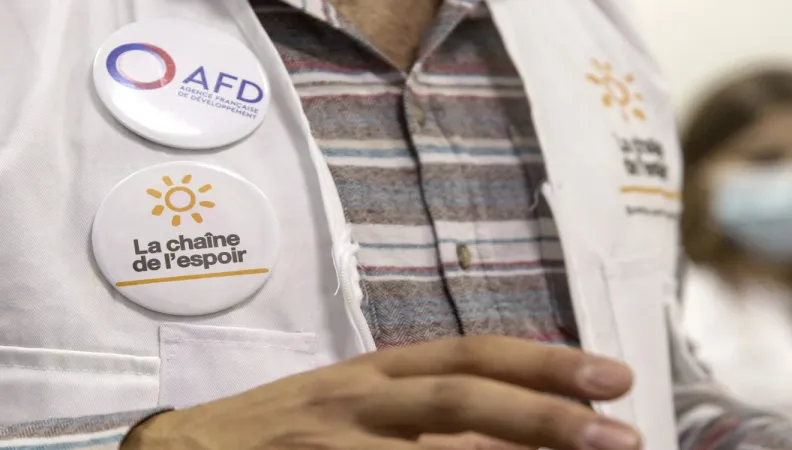Share the page
4 Projects where Partnering with NGOs Improves Access to Healthcare
Published on

In pursuing “Health for All”, the theme of World Health Day 2023, NGOs are actively engaged in the field to enhance access to health care. Here is a selection of four projects sponsored by AFD Group.
IMPROVING ACCESS TO PAIN TREATMENT
Providing access to pain treatment and palliative care for people with cancer, chronic illnesses or HIV/AIDS is the aim of the project conducted in Mozambique and Cambodia by Douleurs Sans Frontières (Pain without Borders). This involves “pain consultations” in hospitals and health centers, as well as home care.
Rosalina*, aged 12 years, has been experiencing tingling pain in her lower limbs for a long time, to the point where she is unable to walk the long distance to school. Following home consultations arranged by Douleurs Sans Frontières and its local partner AMDEC (Mozambican Association for Concerted Development), her mother has agreed to take her to hospital, specifically for the newly introduced Pain Consultation at the Rural Hospital. The treatment also helps her manage her pain, thereby allowing her to return to school.
Luísa*, aged 62 years, is a widow living with her grandchildren. She suffers from high blood pressure, abdominal and leg pain and a swollen stomach. Above, the community health worker conducts a pain assessment. Painkillers are offered during home consultations.
* The names have been changed
MANAGING CONGENITAL ORTHOPEDIC DEFORMITIES
In Lebanon, where finances are the main obstacle to health care, Chain of Hope has partnered with Caritas Lebanon and the Arc En Ciel association, to help children with congenital orthopedic deformities (such as clubfoot and hip dislocation, for instance). They are receiving care from six partner hospitals and two orthopedic equipment centers.
“To operate on my daughter, the hospitals had asked for hundreds of dollars. But I am a Syrian working as a laborer, and a refugee in Lebanon since 2014, so I can't afford it,” says Hussein, father of a patient. The help we received was a lifesaver for my little girl. Thanks to the association, she had the operation.”
The project seeks to strengthen the healthcare system for the prevention, detection and management of congenital orthopedic conditions. Treatment prevents the development of a handicap and thus improves patients’ quality of life and their prospects for integration (in school, professionally, etc.). Ultimately, about 600 children are expected to be treated.
Actions taken include:
- Training paramedical professionals on congenital orthopedic conditions
- Awareness campaigns
- An early detection campaign. The earlier congenital orthopedic conditions are detected (ideally before the age of 6 months), the milder the treatment and the less likely the child will be left with any sequelae (lasting effects)
- Management: surgery and/or protective treatments (casts, orthoses) and/or physiotherapy
CONTROLLING SICKLE-CELL DISEASE
In sub-Saharan Africa, approximately 2% of children are born with a severe form of sickle-cell disease, a genetic condition affecting the red blood cells. Among these children, 50 to 75% die before the age of five if they are not properly treated.
The Fondation Pierre Fabre and its partners in Côte d’Ivoire, the Democratic Republic of the Congo, Central African Republic et and Cameroon have developed a sickle-cell disease control project, aimed at reducing the morbidity and mortality associated with this disease, via a multi-pronged approach:
⦁ Screening: Diagnosis of more than 100,000 newborns, 80,000 pregnant women and 7,000 children through free screening offered in about 50 partner health facilities
⦁ Treatment: Participation in the care of approximately 4,500 sickle-cell children to alleviate the economic cost, while training more than 2,000 health professionals and 3,000 students in treatment
⦁ Raise awareness and obtain the support of public authorities: Supporting civil society organizations in their awareness-raising activities, and national governments in crafting sickle-cell disease control strategies
IMPROVING ACCESS TO COMMUNITY HEALTHCARE FOR CONFLICT-AFFECTED COMMUNITIES
The Tillabéri region of Niger has been severely affected by deteriorating security and the proliferation of non-state armed groups (NSAGs).
The project implemented by ALIMA and its partner BEFEN supports the care of vulnerable communities by building the capacities of community liaison officers and matrons. Access to healthcare for people in remote areas and IDP camps is provided by mobile clinics.
To guarantee a continuum of care, a referral system has been established for severe malnutrition, pediatric emergencies and complicated pregnancies.
The project is also actively engaged in preventing malnutrition via a detection method: training mothers and women of childbearing age in how to use the perimeter-brachial tape, which is used to measure the child’s thinness.
Balkissa’s testimony: “I come from Jakassa, 30 kilometers from Abala. I went to the health center for one of my twins, who is one year old and was suffering from diarrhea and vomiting. The health worker explained to me that in his state of malnutrition, we should be referred to the hospital in Abala. My child’s health is improving day by day. And the care is completely free here. Had this project not existed, I would have had to spend a lot of money.”
